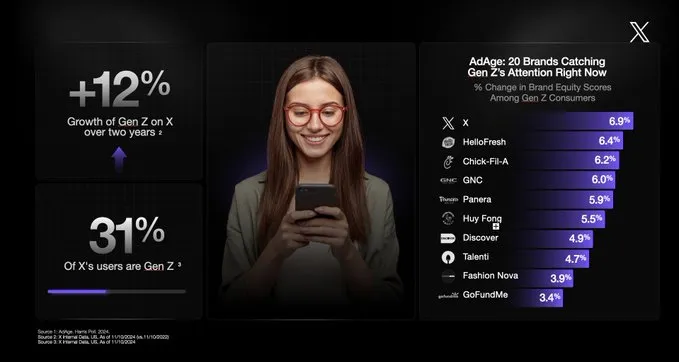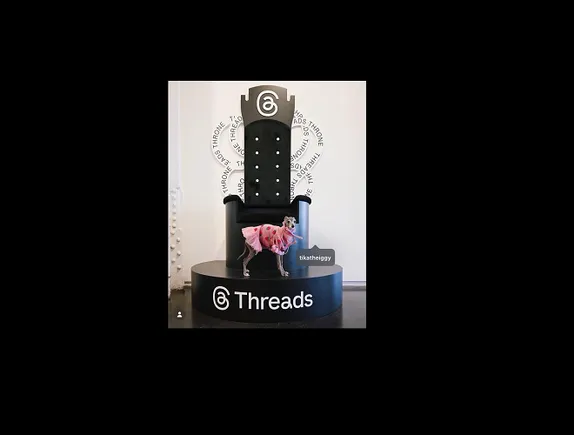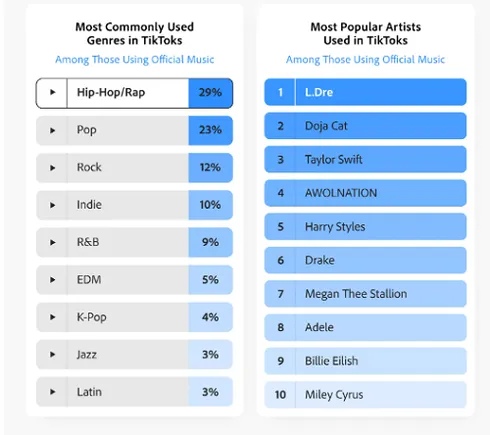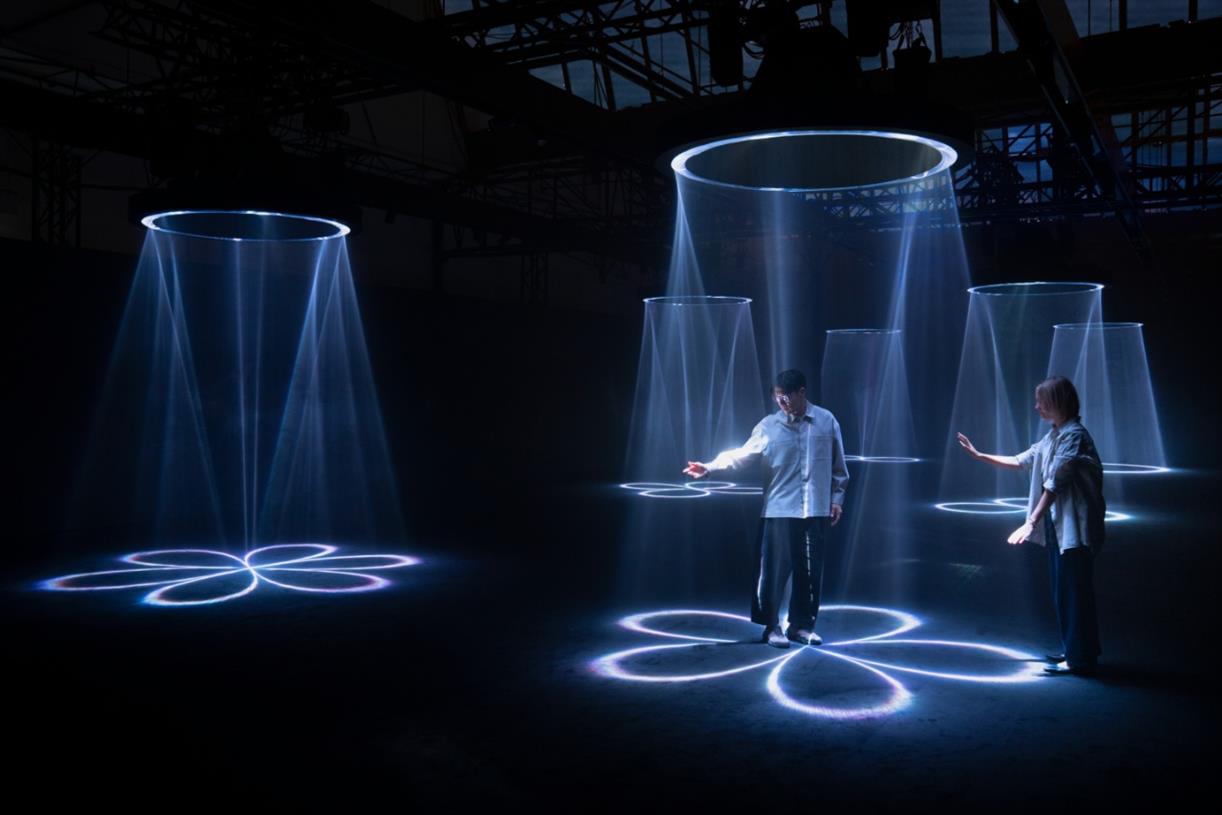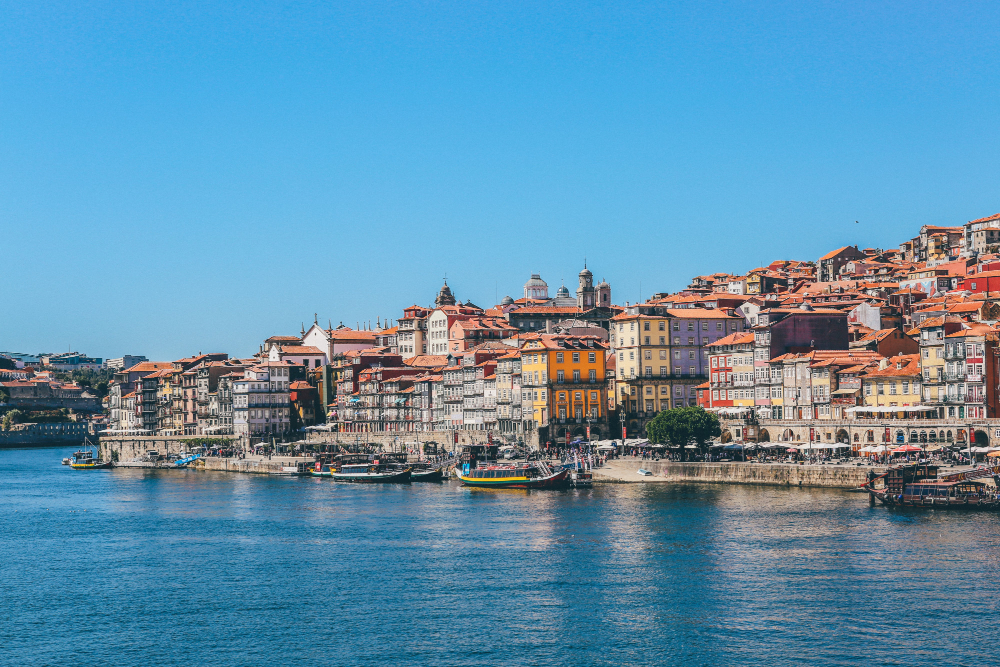Mastering Luxury Branding: Strategies and Inspiring Examples
Welcome to the world of luxury branding, where opulence meets innovation, and exclusivity reigns supreme. In a market teeming with choices, luxury brands have mastered the art of standing out, often defining the standards of excellence themselves. Today, we...

Welcome to the world of luxury branding, where opulence meets innovation, and exclusivity reigns supreme. In a market teeming with choices, luxury brands have mastered the art of standing out, often defining the standards of excellence themselves.
Today, we delve into the fascinating realm of luxury branding strategies, offering a guiding light for brands and companies seeking to craft an indelible mark of distinction.In the ever-evolving landscape of marketing, luxury branding holds a unique position. It transcends the ordinary, curating an aura of prestige that extends beyond products or services. It’s about evoking emotions, building trust, and cultivating loyalty among the discerning clientele who seek the creme de la creme.
Join us as we decode the secrets behind the world’s most coveted luxury brands and discover the strategies that have propelled them to greatness. Whether you’re a seasoned luxury brand looking to reinvent your approach or a newcomer seeking to make a grand entrance, this article is your treasure trove of insights.
Unique Luxury Branding Strategies
Now that we’ve set the stage, let’s unveil the unique luxury branding strategies that have catapulted renowned brands to unparalleled heights. These strategies aren’t just marketing gimmicks; they are the very essence of what makes luxury brands iconic.
Storytelling Through Heritage
One of the most potent tools in the luxury branding arsenal is the art of storytelling through heritage. Brands with rich histories can craft compelling narratives that resonate with their audience on a profound level. The strategy of storytelling through heritage involves leveraging the brand’s legacy to create a captivating story that goes beyond the product itself. This narrative not only connects with consumers but also elevates the brand’s status. For example, Rolex, a brand synonymous with precision and timeless elegance, weaves its heritage into stories of adventures and explorers who relied on Rolex watches during their journeys. Similarly, Chanel steeped in French haute couture tradition, draws from its legacy to evoke images of timeless fashion and sophistication. These brands strengthen their bond with consumers.
Exclusivity and Limited Editions
Exclusivity is the hallmark of luxury, and limited editions take this concept to the pinnacle. Luxury brands that employ this strategy create a sense of scarcity and anticipation among their clientele. Limited edition products or exclusive experiences become coveted treasures for consumers, solidifying the brand’s status as a symbol of prestige. A prime example is Louis Vuitton, who has perfected the art of limited editions. Their limited-run handbags, often adorned with unique designs and materials, become collector’s items. These exclusive offerings are more than just products; they are invitations to be part of an elite club with access to the extraordinary. The branding and marketing strategy of Louis Vuitton is one of a kind, and we’ll talk more about it below!
Artisanal Craftsmanship
The essence of luxury often lies in the meticulous craftsmanship that goes into creating each product. This strategy focuses on showcasing the artistry and attention to detail that defines luxury brands. Brands that excel in artisanal craftsmanship use it as a core brand value, emphasizing quality over quantity. Take Rolls-Royce, for instance, where each automobile is painstakingly handcrafted by skilled artisans. Similarly to it, Hermes is renowned for its dedication to handcrafted leather goods and accessories. These brands elevate their products into works of art, demonstrating the profound value of craftsmanship in luxury branding.
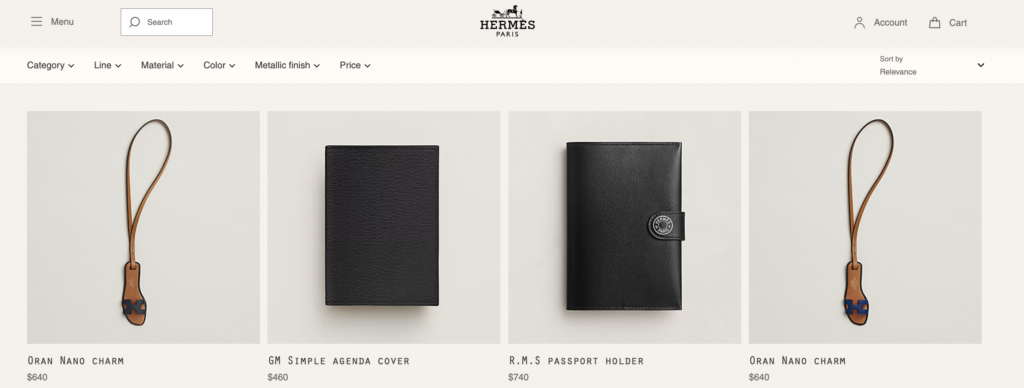
If you’re interested in discovering more about luxury brands and their online presence, especially their website design, make sure to check out our blog post on luxury website design examples!
Personalization and Customization
Luxury brands understand that personalization is the ultimate luxury. In fact, the rise of personalization and customization has emerged as a significant trend in the luxury industry. By allowing customers to personalize their products or experiences, brands create a deep emotional connection. This strategy revolves around tailoring offerings to meet the unique desires and preferences of each customer, thereby enhancing the overall luxury experience.
Burberry, a stalwart in the fashion industry, leverages digital innovation to offer personalized shopping experiences. Customers can customize their iconic trench coats, or scarves, making each piece a unique expression of style. This personalized touch extends beyond the product and transforms shopping into a bespoke journey.
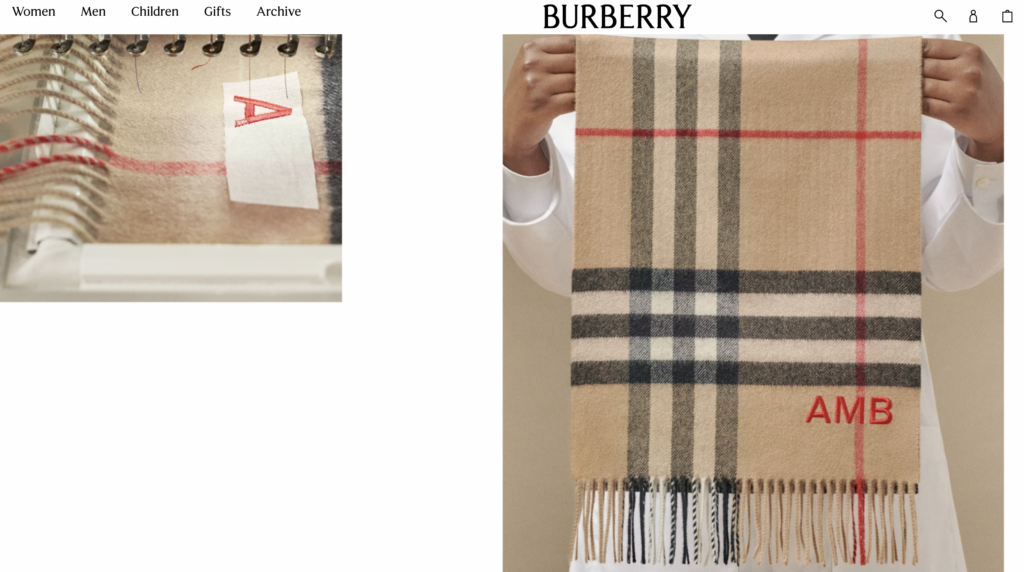
Another example? Consider how Hermès advertising approach bespoke services, from made-to-measure pieces to curated in-store experiences that reflect individual taste and history with the house. As you may know, the brand invites clients into a world where craftsmanship adapts to them, not the other way around. So, one more time; for luxury brands, personalization must feel intentional and human, never automated or intrusive.
Sustainability and Ethical Practices
In today’s socially conscious world, luxury brands are increasingly embracing sustainability and ethical practices. This strategy involves aligning the brand with environmental and ethical principles, not as a mere marketing ploy, but as a core brand ethos. By doing so, luxury brands appeal to the values of discerning consumers who seek products that align with their beliefs. One example of this approach is Patagonia, a brand that has set the standard for ethical and sustainable practices in the outdoor apparel industry. Patagonia’s commitment to sustainability extends far beyond just producing eco-friendly clothing. It’s woven into the very fabric of the company’s identity.
Patagonia not only prioritizes the use of recycled and organic materials in its products but also advocates for conscious consumption. The brand encourages customers to repair and reuse their Patagonia gear, reducing waste and promoting longevity. This focus on durability and repairability speaks volumes about Patagonia’s dedication to sustainability.
Branding Examples by Luxury Brands
Now that we’ve uncovered the unique luxury branding strategies that lay the foundation for success, it’s time to delve into real-world applications. Let’s explore some exemplary campaigns and case studies that serve as beacons of inspiration for any brand aiming to ascend the ranks of opulence.
Rolex: Timeless Elegance
When we think of luxury watches, Rolex invariably comes to mind. Their branding strategy revolves around timelessness and precision. Rolex’s marketing strategies focus on evoking emotions and showcasing their iconic timepieces as more than just watches; they are symbols of aspiration and achievement. With memorable taglines like “A Crown for Every Achievement,” and captivating advertisements featuring explorers and adventurers, Rolex has consistently maintained its status as the epitome of elegance and reliability in the watch industry.
Louis Vuitton: Iconic Monogram
Louis Vuitton’s monogram is an unmistakable symbol of luxury and exclusivity. This luxury brand’s advertising campaigns ingeniously incorporate this iconic pattern into their products, making them instantly recognizable. Through strategic collaborations with artists, celebrities, and designers, Louis Vuitton keeps its image fresh and relevant while preserving its heritage. For instance, the collaboration between the brand and Yayoi Kusama was a huge success, featuring unique in-store designs in selected Louis Vuitton stores and a limited edition series of collaborative products. In this collaboration series, the iconic monogram merges with Yayoi Kusama’s art, creating a unique collection within the world of luxury brand collaborations.
Ferrari: Racing Excellence
Ferrari, the pinnacle of luxury in the automotive world, seamlessly blends performance and prestige. Their branding strategy revolves around their storied history in racing, and they take pride in their racing heritage. Ferrari’s marketing campaigns often showcase the synergy between cutting-edge technology and tradition. The brand’s iconic prancing horse emblem and bold red color evoke a sense of power and speed, emphasizing their commitment to excellence.
Hermes: Craftsmanship Par Excellence
Hermes has built its reputation on unparalleled craftsmanship and attention to detail. They meticulously craft each product, emphasizing quality over quantity. In their advertising campaigns, Hermes often celebrates the artistry of their craftsmen and the dedication that goes into creating their renowned leather goods and accessories such as the Birkin Bag or the Mini Kelly. Their campaigns resonate with the connoisseurs of fine craftsmanship, positioning Hermes as a brand that values the artisanal touch.
Gucci: Embracing Sustainability
Gucci has boldly embraced sustainability and ethical practices as a cornerstone of its brand identity. Their advertising campaigns not only showcase fashion-forward designs but also emphasize their commitment to environmental and social responsibility. Their “Gucci Equilibrium” initiative promotes sustainability and inclusivity, setting an example for other luxury brands to follow. Gucci demonstrates that luxury can be synonymous with conscious consumerism.
Gucci is a prominent fashion brand and it has made a significant transition towards sustainability, incorporating eco-friendly materials and practices into its products. In fact, Gucci aims to reduce its total environmental footprint by 40% by 2025, from a 2015 baseline relative to growth.
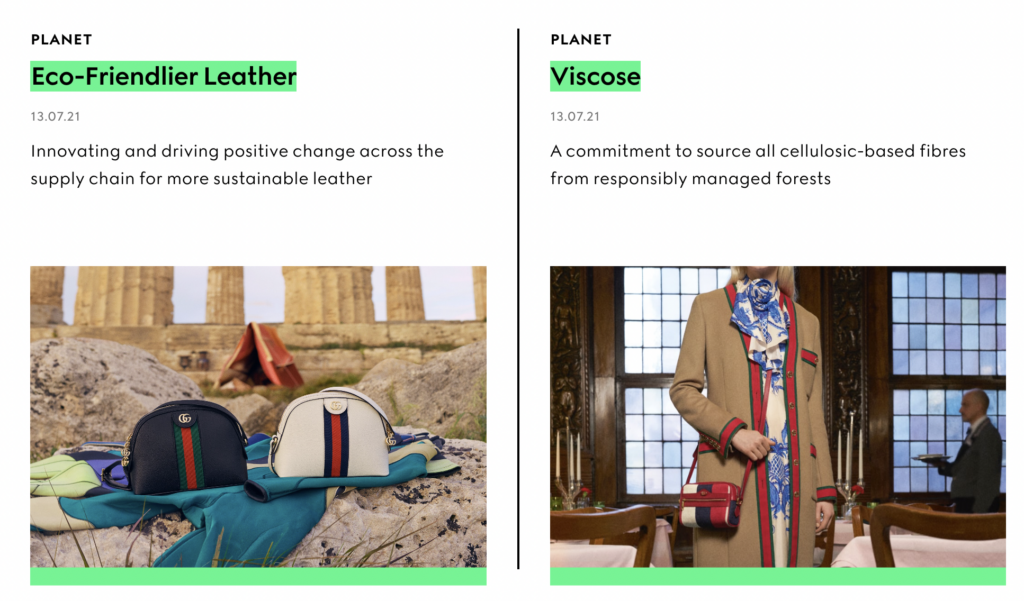
These luxury brand advertising campaigns are not mere marketing endeavors; they are narratives that resonate with audiences, evoking emotions and creating lasting impressions. Each brand has found its unique voice and leveraged its strengths to craft compelling stories that endure. In the realm of luxury, where the expectations of discerning clientele are exceptionally high, crafting a brand that stands out is not a choice but a necessity. Luxury branding is a fusion of artistry and strategy, a delicate dance between tradition and innovation. For those seeking to embark on the path of luxury branding or elevate an existing luxury brand, collaborating with specialized best branding agencies becomes paramount.
These marketing agencies for luxury brands bring expertise, creativity, and a deep understanding of the luxury market to the table. They can help you chart a course that aligns with your brand’s unique identity while ensuring that your message resonates with your target audience.
D’Ussé
NYC-based branding agency The Charles partnered with D’Ussé to focus on brand development and creating a festive and engaging narrative for the luxury cognac brand. Their approach included art direction, content strategy, brand identity and social media engagement, all tailored to enhance the brand’s luxury appeal. A key aspect was involving their Global Brand Ambassador in the creative process, ensuring authenticity and relevance in the cognac market. The campaign highlighted key moments of the holiday season with unique visual content, successfully elevating D’Ussé’s brand presence during this celebratory period.
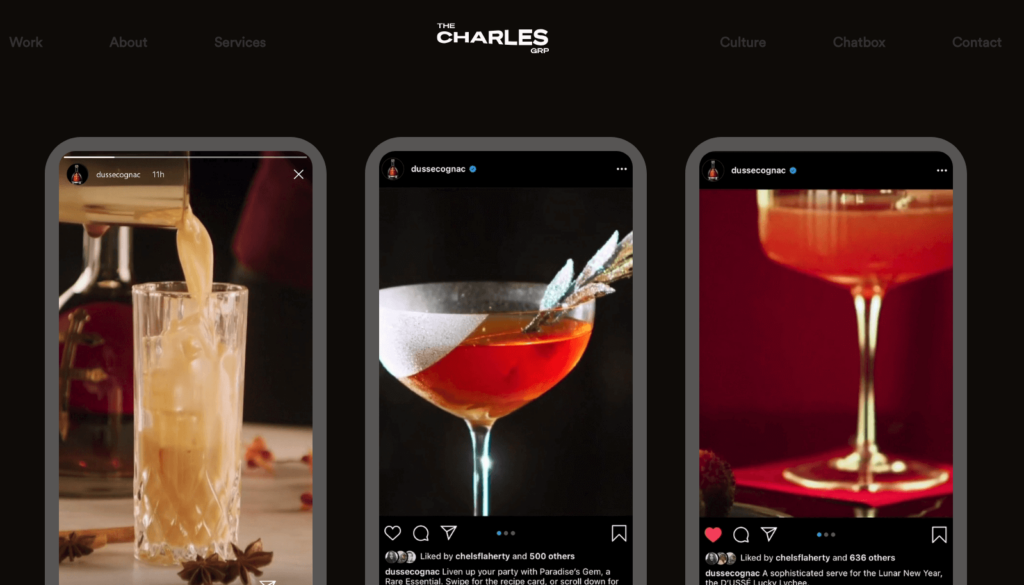
Enya Mond
Enya Mond enlisted the expertise of Fook Communications to develop their brand, and Fook delivered a captivating brand identity that seamlessly blended elegance with genuine support for mothers. The agency began by defining a clear vision rooted in the founder’s mission to help mothers retain their identity through stylish, functional products. The branding featured a distinctive logo symbolizing the parent-child bond, complemented by a sophisticated yet approachable typeface and warm color palette. The tagline, “You’re a mother, but you’re still you,” perfectly encapsulated the brand’s essence. Through a comprehensive approach, including product imagery, print ads, and social media campaigns, Fook Communications successfully rebranded Enya Mond, launching new products and establishing a strong, cohesive brand presence that supports a community of mothers while enhancing the brand’s premium positioning.
Conclusion: Elevating Your Luxury Brand
As we near the end of our journey through the world of luxury branding, it’s essential to reflect on the key takeaways and the overarching theme that binds these strategies and examples together: the pursuit of uniqueness and excellence. The branding and advertising strategies of luxury brands we’ve uncovered, along with the inspiring examples set by iconic luxury brands, provide a blueprint for achieving excellence in the world of luxury.
As you embark on your own luxury branding journey, remember that uniqueness is the key to leaving an indelible mark in the hearts and minds of your audience. Whether you’re crafting a legacy brand or reinventing one, the world of luxury branding holds boundless possibilities.
So, embrace your brand’s heritage, infuse it with creativity, and align it with the values of today’s conscious consumers. As you do so, you’ll not only create a brand but a legacy that transcends time, establishing your place among the elite in the world of luxury.

 JaneWalter
JaneWalter 








_1.png)
